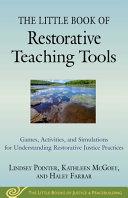[Read] PDF/Book The Little Book of Restorative Teaching Tools: Games, Activities, and Simulations for Understanding Restorative Justice PracticesLindsey Pointer

Ebook PDF The Little Book of Restorative Teaching Tools: Games, Activities, and Simulations for Understanding Restorative Justice Practices | EBOOK ONLINE DOWNLOAD
If you want to download free Ebook, you are in the right place to download Ebook. Ebook/PDF The Little Book of Restorative Teaching Tools: Games, Activities, and Simulations for Understanding Restorative Justice Practices DOWNLOAD in English is available for free here
[Download] Link : [Downlload Now] The Little Book of Restorative Teaching Tools: Games, Activities, and Simulations for Understanding Restorative Justice Practices
Read More : [Read Now] The Little Book of Restorative Teaching Tools: Games, Activities, and Simulations for Understanding Restorative Justice Practices
Description Engaging Practices for Integrating Restorative Justice Principles in Group Settings
As restorative practices spread around the world, scholars and practitioners have begun to ask very important questions: How should restorative practices be taught? What educational structures and methods are in alignment with restorative values and principles? This book introduces games as an effective and dynamic tool to teach
restorative practices. Grounded in an understanding of restorative pedagogy and experiential learning strategies, the games included in this book provide a way for learners to experience and more deeply understand restorative practices while building relationships and improving skills. Chapters cover topics such as:
Introduction to restorative pedagogy
Discussion of learning and restorative practices
Overview of games as teaching tools
Implementation of games-based training
Games for building restorative communities, strengthening relationships, understanding restorative philosophy, and developing skills in the practice
An ideal handbook for educators, restorative justice program directors and trainers, consultants, community group leaders, and anyone else whose work draws people together to resolve disagreements or address harm, this book will serve as a catalyst for greater creativity and philosophical alignment in the teaching of restorative practices across contexts.
